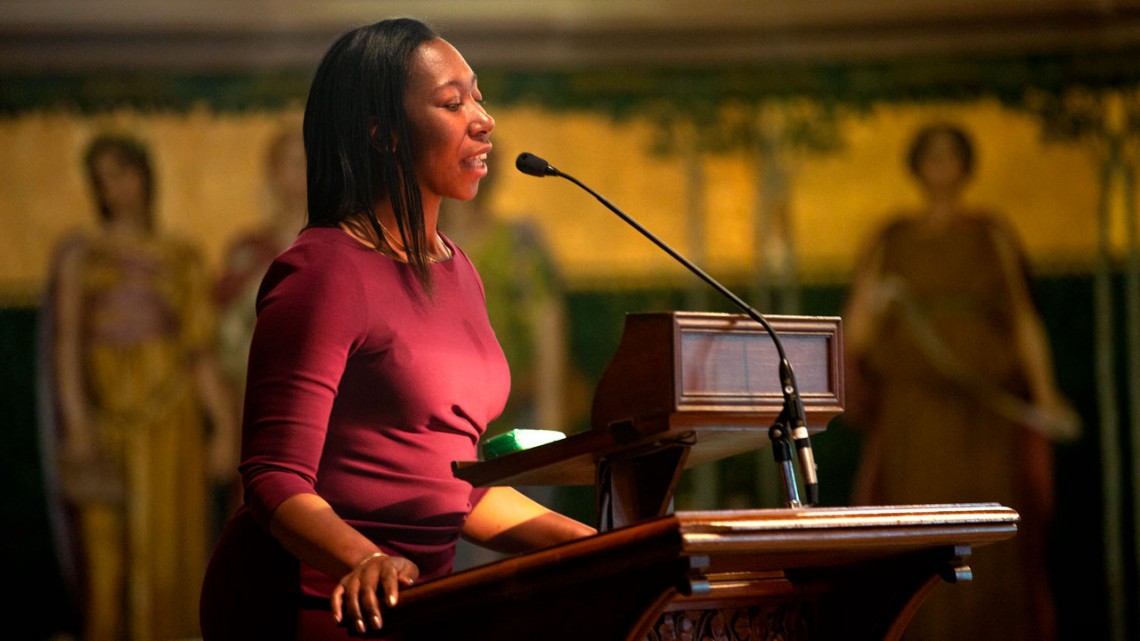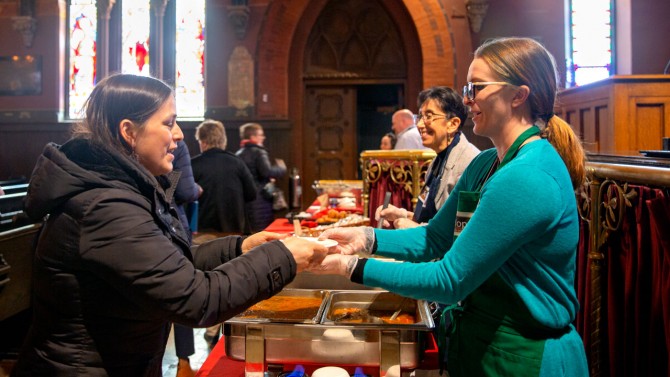
Angela Winfield addresses the Soup & Hope audience March 14 in Sage Chapel.
Lean into uncertainty, AVP Winfield says at Soup & Hope
By Nancy Doolittle
Angela Winfield, J.D. ’08, may have lost her sight at age 19, but she did not lose her vision.
Speaking March 14 to an audience of more than 100 in Sage Chapel in the latest installment of Soup & Hope, Winfield said she learned that leaning into uncertainty unleashes the power of possibility.
“Things do not go as planned; things don’t happen as you expect them to,” Winfield said. “And for me, in my experience, that has been the best thing possible.”
Now Cornell’s associate vice president for inclusion and workforce diversity, the former attorney was diagnosed at age 4 with a condition that would eventually cause total blindness. For years she struggled with worsening eyesight, but she knew something was really wrong when, while a sophomore at Barnard College, she woke up one morning with a severe headache.
She went to class anyway but could not read the notes she had written. As Winfield walked back to her dorm, her vision became cloudy and then was lost altogether. Somehow she finished the semester, but knew she would need to decide whether to return to college.
“I was certain that being a blind woman, let alone a blind African-American woman, there were no options for me,” she said.
Then her innate curiosity kicked in. “What if, even if I am blind, having no options is not a certainty?” she said. “How would I know? I need at least to try.”
For Winfield, the power of uncertainty and change became the power of possibility.
She found she could move forward, with the support of her family, of others she encountered, and – eventually – her service dog. She went back to college for her junior year, and her mother helped her fill out an application to study abroad at Queen Mary College in London. Her family bought her a laptop and luggage, and that spring her brother accompanied her to England, helping set her up in an apartment.
When someone asked Angela why she continued to wear glasses when she could no longer see, Angela realized that she only wore them because she found their familiarity comforting. She never wore them again.
“I was no longer the person trying to see,” she said. “I was someone who wanted vision, I wanted insight, I wanted to experience, to lean into the uncertainty and to harness the power of possibility. I never expected all of the joy, all the experience, all the learning, all the people who showed up for me.”
An introvert by nature, Winfield has learned to connect with and learn from others.
After using a cane for a year and a half, Winfield opened herself to another new possibility: living and bonding with a service dog.
“With a cane, you are constantly thinking about what your hands are feeling through that cane: a change in elevation, in the texture of the surface you are walking on, a barrier. With a dog, you can walk freely,” she said. “A dog also helps you form connections with other people.”
The relationship with a service dog is a combination of a number of different relationships, she said, noting the dog is more than a tool or a pet.
“You form an incredible bond, based on teamwork and trust,” she said.
Most days, Winfield does not think about her loss of sight. It took time to grieve that loss, and there are still good days and bad days. But Winfield said she has lost the convenience of sight – not herself.
“I plan to the hilt, I am prepared, I have a plan B and contingencies – but then it is time to let go,” she said. “I know things will change, so I need to enjoy them, to be grateful for them while I have them. Plans may change, but there are greater plans out there, and there is loads of hope.”
Media Contact
Get Cornell news delivered right to your inbox.
Subscribe

